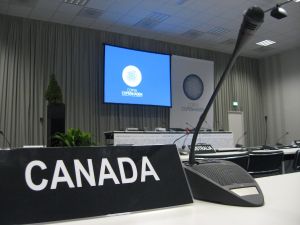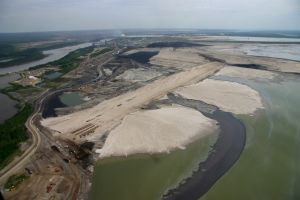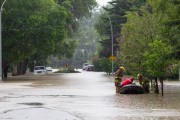Canada's performance at the recent UN climate conference in Copenhagen came under scrutiny again this week, after an internal Chinese government report was leaked to British newspaper The Guardian. The report said Canada played a "conniving" role in trying to convince other countries that its level of ambition on climate change would be adequate, and claimed the US-led "umbrella group" of nations - of which Canada is a member - adopted a "position of inaction" at the international climate negotiations. As Mike de Souza reports for Canwest, federal Environment Minister Jim Prentice rejected those allegations, stating, "We were not conniving," and pointing at China's reluctance to allow international monitoring of its own progress on reducing greenhouse gas (GHG) emissions.
 But the Chinese government isn't alone in thinking less of Canada in the wake of the U.N. climate summit - a new global poll by Globescan/BBC released in the lead-up to the Vancouver Olympics found that perceptions of Canada's influence abroad have declined in the past year, with the greatest declines reported among residents of the U.S., the U.K. and China. (Notably, the percentage of Canadians who feel Canada has a positive influence internationally fell 11 percentage points to 75%, compared to 86% at this time last year.) As the CBC reports, pollsters and academics suspect that Canada's poor environmental performance and growing opposition to oilsands development were at least partly to blame.
But the Chinese government isn't alone in thinking less of Canada in the wake of the U.N. climate summit - a new global poll by Globescan/BBC released in the lead-up to the Vancouver Olympics found that perceptions of Canada's influence abroad have declined in the past year, with the greatest declines reported among residents of the U.S., the U.K. and China. (Notably, the percentage of Canadians who feel Canada has a positive influence internationally fell 11 percentage points to 75%, compared to 86% at this time last year.) As the CBC reports, pollsters and academics suspect that Canada's poor environmental performance and growing opposition to oilsands development were at least partly to blame.
 In a further show of such opposition, U.S.-based environmental group Forest Ethics recently launched a campaign encouraging influential corporations to formally state their opposition to high-carbon oilsands development. This week, that campaign prompted two U.S. Fortune 500 companies to announce plans to transition away from using fuel derived from the Canadian oilsands in its trucking fleets, the Toronto Star's Mitch Potter reports. While some critics dismissed the announcement as "greenwashing" to appeal to eco-minded consumers (noting that, once the crude product from Alberta enters refineries, it gets mixed with product from other sources and redistributed), others suggested the move - even if it's primarily symbolic - sets an important precedent and could inspire other major companies to follow suit, according to Shawn McCarthy and Nathan VanderKlippe's report in the Globe and Mail.
In a further show of such opposition, U.S.-based environmental group Forest Ethics recently launched a campaign encouraging influential corporations to formally state their opposition to high-carbon oilsands development. This week, that campaign prompted two U.S. Fortune 500 companies to announce plans to transition away from using fuel derived from the Canadian oilsands in its trucking fleets, the Toronto Star's Mitch Potter reports. While some critics dismissed the announcement as "greenwashing" to appeal to eco-minded consumers (noting that, once the crude product from Alberta enters refineries, it gets mixed with product from other sources and redistributed), others suggested the move - even if it's primarily symbolic - sets an important precedent and could inspire other major companies to follow suit, according to Shawn McCarthy and Nathan VanderKlippe's report in the Globe and Mail.
Finally, as the week began with a meeting of the G7 finance ministers in the Arctic, the CBC's Bob MacDonald, host of the science and technology show Quirks and Quarks, speculated that the ministers would be too busy discussing ways to maximize the potential of open shipping lanes through the Arctic seas, that they would fail to understand the seriousness of the climactic changes behind such opportunities. Results from Canada's largest Arctic climate change study, reported by the CBC, shed new light on those changes, as lead investigator David Barber reports that arctic ice is melting "much faster than our most pessimistic projections."








